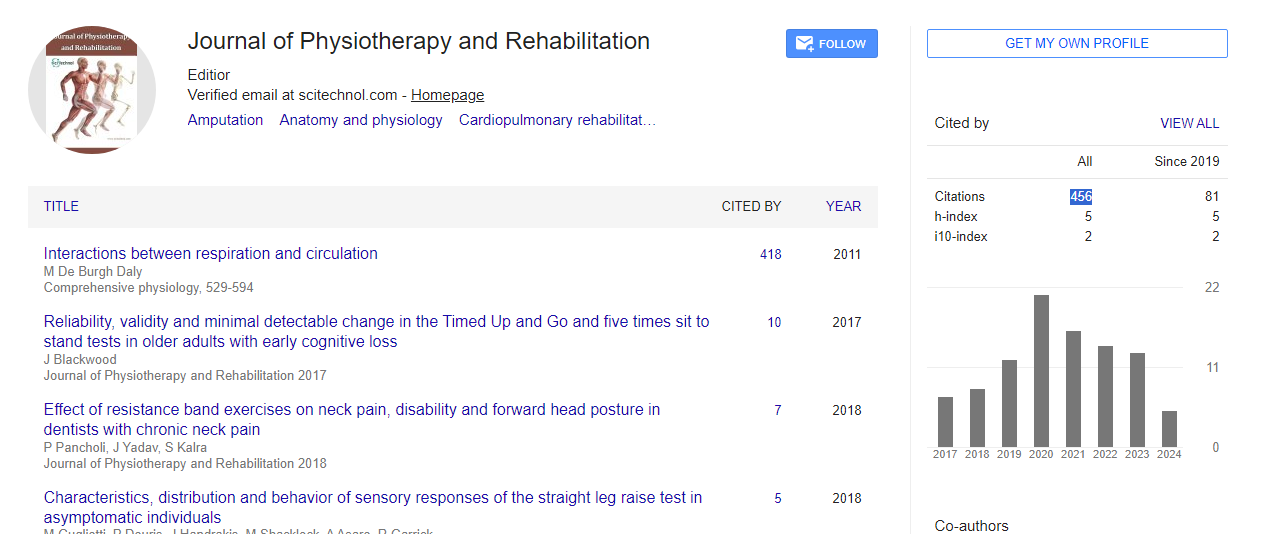Perspective, J Physiother Rehabi Vol: 7 Issue: 2
Early Intervention Benefits of Pediatric Physiotherapy
Mintaz Silverman*
Department of Medicine, University of Louisville School of Medicine, Louisville, United States of America
*Corresponding Author: Mintaz Silverman
Department of Medicine, University of Louisville School of Medicine, Louisville, United States of America
E-mail: silvermintaz@gmail.com
Received date: 22 March, 2023, Manuscript No. JPTR-23-99182;
Editor assigned date: 24 March, 2023, Pre QC. JPTR-23-99182 (PQ);
Reviewed date: 15 April, 2023, QC No. JPTR-23-99182;
Revised date: 22 April, 2023, Manuscript No. JPTR-23-99182 (R);
Published date: 28 April, 2023, DOI: 10.4172/JPTR.1000123
Citation: Silverman M (2023) Early Intervention Benefits of Pediatric Physiotherapy. J Physiother Rehabi 7:2.
Description
Pediatric physiotherapy is a specialized field of physical therapy that focuses on the treatment of children with developmental and physical disabilities. It aims to promote the development of movement and functional abilities, as well as prevent and manage impairments and disabilities. Early intervention through pediatric physiotherapy can provide numerous benefits for children and their families.
Understanding pediatric physiotherapy
Pediatric physiotherapy is a comprehensive treatment approach that is designed to meet the unique needs of children. It focuses on helping children with movement and physical limitations due to congenital conditions, injury, or developmental delays. The goal of pediatric physiotherapy is to enable children to achieve their maximum potential in physical function and mobility, while promoting their overall health and well-being.
It involves the assessment, diagnosis, and treatment of children with motor delays or disorders. Physiotherapists develop individualized treatment plans that incorporate a range of therapeutic exercises, activities, and interventions. They work with children and their families to improve gross motor skills, balance, coordination, endurance, and strength.
Benefits of early intervention
Early intervention is the key to maximizing the benefits of pediatric physiotherapy. When children are identified with developmental delays or motor impairments, early intervention can help to address these issues before they become more severe. Early intervention provides a window of opportunity to optimize the child's development, which can lead to better long-term outcomes.
Pediatric physiotherapy can be beneficial for children with a range of conditions, including cerebral palsy, spina bifida, Down syndrome, developmental coordination disorder, and autism. It can also be helpful for children who have experienced trauma or injury, or who have undergone surgery.
The benefits of early intervention through pediatric physiotherapy are numerous. Physiotherapists can work with children from infancy to adolescence, providing tailored treatment plans that are appropriate for their age and developmental level. Through early intervention, physiotherapists can help to:
Improve motor skills: Pediatric physiotherapy can help children to develop gross motor skills, such as sitting, crawling, standing, and walking. It can also help to improve fine motor skills, such as grasping and reaching. By improving these skills, children can become more independent and able to participate in daily activities.
Promote independence: Pediatric physiotherapy can help children to become more independent in their daily lives. By improving their mobility and functional abilities, children can learn to perform selfcare tasks, such as dressing, grooming, and feeding, with greater ease.
Enhance socialization: Pediatric physiotherapy can help children to improve their socialization skills. By improving their physical abilities, children can participate in social activities and interactions with peers. This can lead to improved self-esteem and confidence.
Manage pain and discomfort: Pediatric physiotherapy can help to manage pain and discomfort associated with physical impairments. By improving mobility and reducing muscle tension, children can experience less pain and discomfort, which can lead to improved quality of life.
Improve long-term outcomes: Early intervention through pediatric physiotherapy can improve long-term outcomes for children with motor impairments or developmental delays. By addressing these issues early, physiotherapists can help to optimize a child's development and reduce the risk of future complications.
Conclusion
Pediatric physiotherapy can provide numerous benefits for children and their families. Early intervention is the key to maximizing these benefits, as it can help to optimize a child's development and improve long-term outcomes. Through a comprehensive approach that incorporates therapeutic exercises, activities, and interventions, physiotherapists can help children to improve their motor skills, promote independence, enhance socialization, manage pain and discomfort, and improve overall quality of life.
 Spanish
Spanish  Chinese
Chinese  Russian
Russian  German
German  French
French  Japanese
Japanese  Portuguese
Portuguese  Hindi
Hindi 